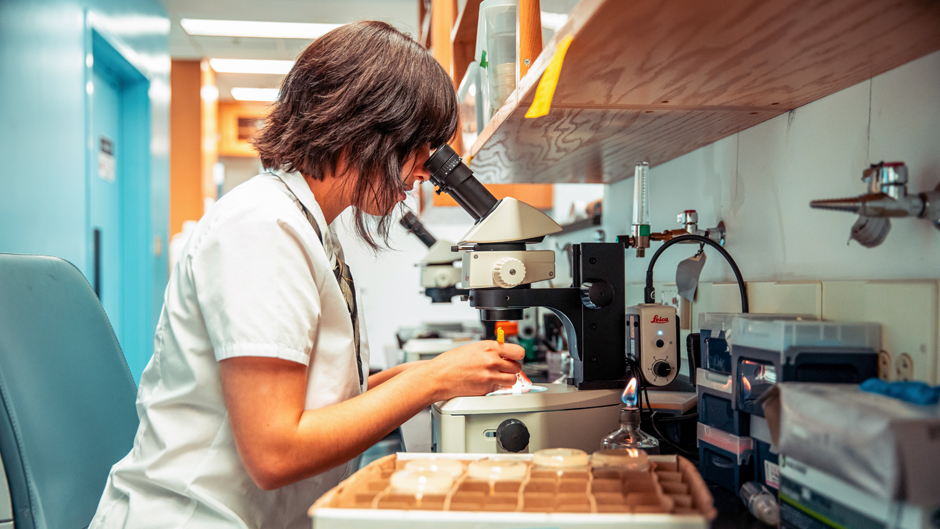Before this summer, Fiona Machado had never set foot inside a research lab.
She did not know how to use a microscope properly, or how to sterilize lab equipment and tools to handle tiny worms called the C. elegans using an ethanol burner.
But now, as she finishes up 10 weeks of working in associate professor Kevin Collins’ biology lab at the University of Miami, Machado, a second-year honors student at Miami Dade College, can do all of these things. She also learned how to take photos and video of the microscopic worms and can navigate through a host of software programs to help index her findings. These are just a few things Machado picked up during her undergraduate research experience this summer.
“This is the first time I’ve done any research, so it’s been really interesting to see how a lab operates on a daily basis,” said Machado, a neuroscience major who is working to understand the chemical signaling that happens when the worms mate. Collins’ lab uses the C. elegans as a simple model to try and understand how human neurons communicate, causing us to have physical responses to things like antidepressants. “Hopefully, doing this type of work will help me to get even more research opportunities.”
Machado is one of a few dozen undergraduate students that spent 10 weeks working in research labs across the Coral Gables Campus this summer, in programs like the Miami Dade College Undergraduate Research Internship Program, Research Experiences for Undergraduates (REU) in the Physical Sciences, funded by the National Science Foundation, and the Florida-Georgia Louis Stokes Alliance for Minority Participation program. Thirty other undergraduate students also spent 10 weeks doing research at the Miller School of Medicine through the Summer Undergraduate Research Fellowship program.
“We have a potpourri of different research programs happening this summer,” said Michael Gaines, assistant provost for undergraduate research and community outreach. “These experiences help undergraduate students get a broader perspective on research to see how things are done at other university labs, and they also allow undergrads to interact with like-minded students in their discipline from across the country.”
Eight students from colleges across the United States were selected for the REU positions and spent time with seven different faculty members in the Department of Physics at the College of Arts and Sciences. Allyson Hudak, a rising senior at the University of Miami, spent time in professor Joshua Gundersen’s lab studying tools to measure matter in the universe, while Sebastian Martinez, from Carnegie Mellon University, studied new properties of light with professor Olga Korotkova. Breelyn Cocke from Northern Arizona University, along with J’nesse Balkman, a junior at the University of Miami, learned how to quantify water flow around starfish and other marine invertebrates in assistant professor Vivek Prakash’s lab, which could aid in the development of new robotic tools.
At a final research poster session last week, Korotkova said it was the first time the department has received REU students, and she was encouraged by their progress.
“We are all pleased to see how the students helped each other with their research, and I was impressed with the projects they completed in just 10 weeks,” she said. “They were also very engaged with faculty, graduate students, and postdocs.”
Martinez, who is majoring in physics, also enjoyed his summer working with Korotkova.
“I got the chance to see how professors come up with theories, which was very cool, and I learned a lot about orbital angular momentum (a property of light), so I definitely feel like I’ll have an advantage in my physics classes next year,” he said.
To learn more about summer research experiences, visit the Office of Undergraduate Research and Community Outreach website, or search for your chosen subject area on the National Science Foundation’s REU website.

